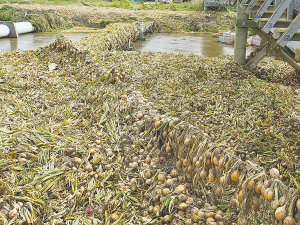EPA remains committed to deliver improved outcomes
OPINION: At the end of my first year as chair of the Environmental Protection Authority (EPA), I have been reflecting on the progress made in the time I have been in the role.
 Onions are among the debris in and around Karamu Stream, near Whakatu a rural community in Hastings. Photographer Mark Sudfelt, owner of Peak Video, Hawke’s Bay took the photo after Cyclone Gabrielle ripped through the region. The onions came from a large field several hundred metres upstream. Photo: Mark Sudfelt.
Onions are among the debris in and around Karamu Stream, near Whakatu a rural community in Hastings. Photographer Mark Sudfelt, owner of Peak Video, Hawke’s Bay took the photo after Cyclone Gabrielle ripped through the region. The onions came from a large field several hundred metres upstream. Photo: Mark Sudfelt.
The cost of Cyclone Gabrielle will run into the billions of dollars over the coming years
HortNZ chair Barry O’Neil says just taking into account the crop losses and the cost of re-establishing orchards and commercial growing land this year alone, the figure of $1 billion is being bandied about. He also warns it won’t be a one-off hit, with losses being felt for several years to come.
O’Neil told Hort News that it’s too early to put a figure on what the cyclone may cost NZ in terms of lost export earnings. However, he points out that NZ still produces very high quality fruit and vegetables and will continue to do that.
“There is no need to for overseas markets to be concerned that this won’t continue.”
O’Neil says for the past few weeks, the priority has been ensuring that people are safe and now the emphasis is on recovery. He says while the initial government grant of $2,000 to help clean up land is great, the reality is that it will cost many orchardists more like $40,000 to get their orchards cleaned up before they can even think about replanting again.
“Groups are currently being established to work through the various options,” he told Hort News. “MPI have done a tremendous job and I really appreciate the efforts of the Prime Minister, and Ministers of Finance and Agriculture and others for engaging and fronting up to growers, finding out for themselves what is going on.”
O’Neil says he looks forward to working with the Government to go to the next step, which is the re-establishment of orchards and how they can be financially supported. He says many of the banks are holding mortgages on orchards and it’s unlikely they will be able to do much.
O’Neil points to the option of government making finance available in the form of a suspensory loan or some short term financial arrangement to get growers back on track.
The labour to help with the cleanup and harvest doesn’t appear to be a major problem.
“The fact that government has relaxed some of the immigration laws has helped. People with diggers and bobcats are coming to Hawke’s Bay to help and this is very heartening.”
While the focus has to a large degree been on apples, O’Neil says vegetable crops have been very badly hit with the kumara crop practically wiped out in Dargaville. Crops such as squash and onions are facing the same fate.
He says hopefully these growers will be able to bounce back in the next 12 months by being able to work the silt back into the soil.
“If they are supported by the banks they will be able to operate in a reasonable short period of time because they don’t have to wait six years like an apple grower has to.”
O’Neil believes that, overall, kiwifruit probably suffered more from the October frost than Cyclone Gabrielle. He really feels for the Ngai Tukairangi Trust whose big orchard near Hastings has been devastated by Gabrielle.
O’Neil told Hort News that, in the case of kiwifruit, if the present vines managed to survive, it will be possible to graft new stock on to these and it may take only two or three years for those growers to get a commercial crop.
In the meantime, he says everyone in the hort sector is chipping in and those who can are helping their fellow growers.
“It all now all hinges on getting the help to restoring the industry to its former self.”
Fonterra’s impending exit from the Australian dairy industry is a major event but the story doesn’t change too much for farmers.
Expect greater collaboration between Massey University’s school of Agriculture and Environment and Ireland’s leading agriculture university, the University College of Dublin (UCD), in the future.
A partnership between Torere Macadamias Ltd and the Riddet Institute aims to unlock value from macadamia nuts while growing the next generation of Māori agribusiness researchers.
A new partnership between Dairy Women’s Network (DWN) and NZAgbiz aims to make evidence-based calf rearing practices accessible to all farm teams.
Despite some trying circumstances recently, the cherry season looks set to emerge on top of things.
Changed logos on shirts otherwise it will be business as usual when Fonterra’s consumer and related businesses are expected to change hands next month.